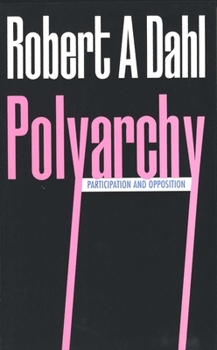Polyarchy: Participation and Opposition
Select Format
Select Condition 
Book Overview
"A tightly woven explanation of the conditions under which cultures that do not tolerate political opposition may be transformed into societies that do."--Foreign Affairs " Dahl's] analysis is lucid, perceptive, and thorough."--Times Literary Supplement Amidst all the emotional uproar about democracy and the widespread talk of revolution comes this clear call to reason--a mind-stretching book that equips the young and the old suddenly to see an ageless problem of society in a new and exciting way. Everything Dahl says can be applied in a fascinating way to the governing of any human enterprise involving more than one person--whether it is a nation-state, a political party, a business firm, or a university.
Format:Paperback
Language:English
ISBN:0300015658
ISBN13:9780300015652
Release Date:September 1972
Publisher:Yale University Press
Length:272 Pages
Weight:0.76 lbs.
Dimensions:0.7" x 5.1" x 8.0"
Customer Reviews
1 rating
Classic of political science that is still relevant today
Published by Thriftbooks.com User , 21 years ago
Dahl's work, which has been cited by countless political scientists since it was first published, provides a useful framework for the examination of democracy (which is not quite equivalent to what he terms 'polyarchy'; democracy consists of a bit more than a polyarchal system). The book is particularly concerned with the two main variables of political orders: 'competition' (public contestation among various political actors) and 'participation' (defined with regards to the right to participate). Using these variables, these systems can graded based on whether they possess these qualities to a greater or lesser degree. While most modern political systems fall in a 'gray area' (they are neither perfectly competitive nor inclusive), Dahl believes that all should strive towards the ideal type, or polyarchy. Dahl goes on to outline the benefits of a polyarchal system and the various ways in which such a system can be achieved. Yet, Dahl also recognizes that the transition to polyarchy is neither inevitable nor invariably desirable. Certain conditions are needed in order for the full benefits of a polyarchy to be realized. Thus, the minimal nature of Dahl's conception allows flexibility in its application. This is why his notion of democracy, as defined through polyarchy, has been adopted time again by those engaging in the debate over democracy, including such luminaries as Samuel P. Huntington and Larry Diamond.





